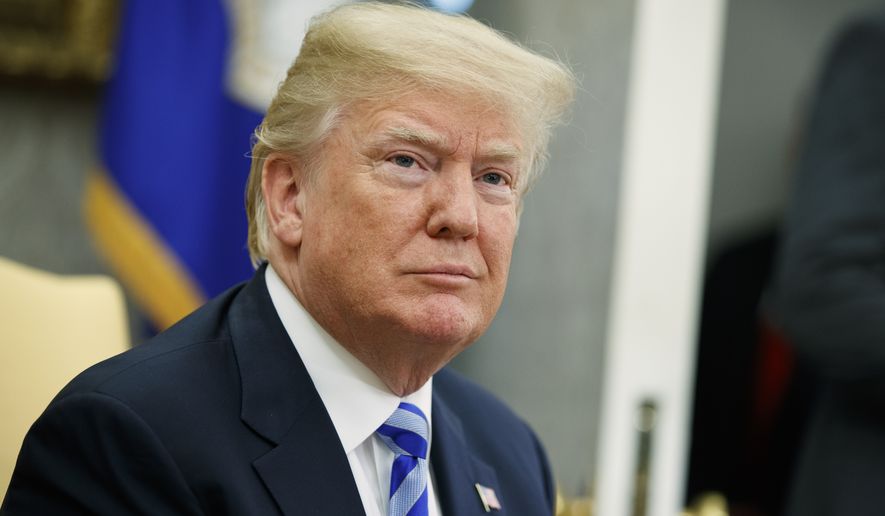President Trump cannot block people from his Twitter account, a federal judge ruled Wednesday, saying the account became a public forum once he started using it for government business and is now protected by the First Amendment.
Free speech advocates called U.S. District Judge Naomi Reice Buchwald’s ruling groundbreaking, saying it will expand constitutional protections deep into the realm of social media.
The ruling is unlikely to change much of what Mr. Trump does on @realDonaldTrump, his main platform for engaging the public. But it could affect the conversation that erupts among supporters and opponents in the replies beneath his tweets. Judge Buchwald said the president is no longer allowed to shape the conversation by icing out some of his critics.
“The blocking of the individual plaintiffs from the @realDonaldTrump account because of their expressed political views violates the First Amendment,” declared the judge, a Clinton appointee who serves on a court in New York.
She ruled in favor of a handful of Twitter users Mr. Trump blocked after they posted antagonistic or obnoxious replies to his @realDonaldTrump account.
The users said Mr. Trump was crimping their right to react in the public sphere.
The key question facing the judge was whether Mr. Trump’s account amounted to a forum like a public park or a town square — places the Supreme Court has held to be First Amendment spheres of interaction.
Justice Department attorneys argued that the account was personal and therefore immune to those claims. Mr. Trump created his Twitter account in 2009, well before he was involved in politics, much less in the White House. He had already amassed 20.5 million followers and had posted 34,300 tweets before he took office in January 2017.
Since then, he has built his following to 52.2 million and added another 3,400 tweets, including major policy and personnel announcements. He laid out his plans for reinstating a ban on transgender troops serving in the military via Twitter and announced his nomination of an FBI director and the ouster of Secretary of State Rex W. Tillerson on the platform.
Judge Buchwald said it was those tweets, often posted with the help of social media guru Dan Scavino, who is now an official White House employee, that make the president’s account a public forum.
She also pointed out that the National Archives considers @realDonaldTrump an official government document and requires that tweets be preserved as White House records.
The White House didn’t respond to a request for comment. The Justice Department, which defended Mr. Trump in the case, said it disagreed with the decision and was considering its next steps.
Free speech advocates, though, hailed the ruling.
“This decision is a critical victory in preserving free speech in the digital age,” said Joshua Geltzer, executive director of Georgetown Law’s Institute for Constitutional Advocacy and Protection.
Anyone, regardless of whether they have a Twitter account, can generally view @realDonaldTrump tweets.
But being able to comment on a tweet requires following the president — and blocking someone means he or she cannot jump in with their thoughts.
It is not clear how many people Mr. Trump has blocked, but online tallies list some of the names: author Stephen King, anti-Trump activist Holly Figueroa O’Reilly and Daily Kos editor Rebecca Pilar Buckwalter Poza, who was one of the plaintiffs in the lawsuit.
“I sued the president, and I won,” Ms. Buckwalter Poza said on Twitter.
She was blocked last year after tweeting to Mr. Trump: “To be fair you didn’t win the WH: Russia won it for you.”
The government did not dispute that Mr. Trump blocked people because of those kinds of antagonistic tweets.
Judge Buchwald said that proved he was engaging in viewpoint discrimination.
“This case requires us to consider whether a public official may, consistent with the First Amendment, ’block’ a person from his Twitter account in response to the political views that person has expressed, and whether the analysis differs because that public official is the president of the United States. The answer to both questions is no,” she concluded.
She also rejected the suggestion that since Twitter is a private company it is beyond the reach of First Amendment forum rules. Because Mr. Trump and Mr. Scavino also retain control over the account, she said, it’s a government space as well.
During a hearing this year, she suggested that Mr. Trump could “mute” offending accounts so he wouldn’t have to hear from them, but they could still interact with others beneath his tweets — a compromise that doesn’t appear to have gained traction with the president.
Judge Buchwald said she wouldn’t order Mr. Trump and Mr. Scavino to change their behavior and didn’t want to get into a separation of powers battle. Instead, she said she was confident they would “remedy the blocking we have held to be unconstitutional.”
Those who have been blocked said they were waiting.
“Clock’s ticking,” wrote Jameel Jaffer, director of the Knight First Amendment Institute at Columbia University, which argued the case for the blocked account holders.
• Alex Swoyer contributed to this article.
• Stephen Dinan can be reached at sdinan@washingtontimes.com.




Please read our comment policy before commenting.